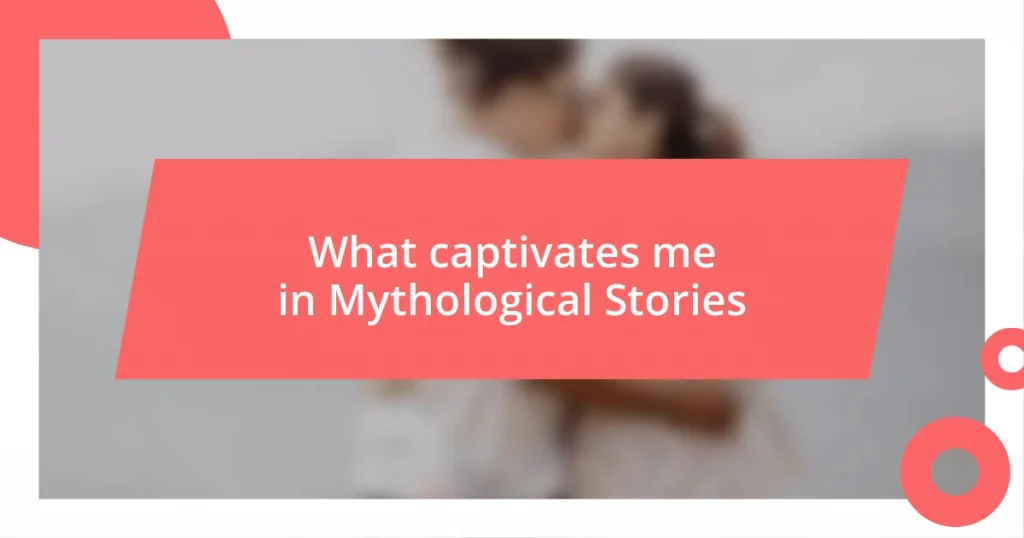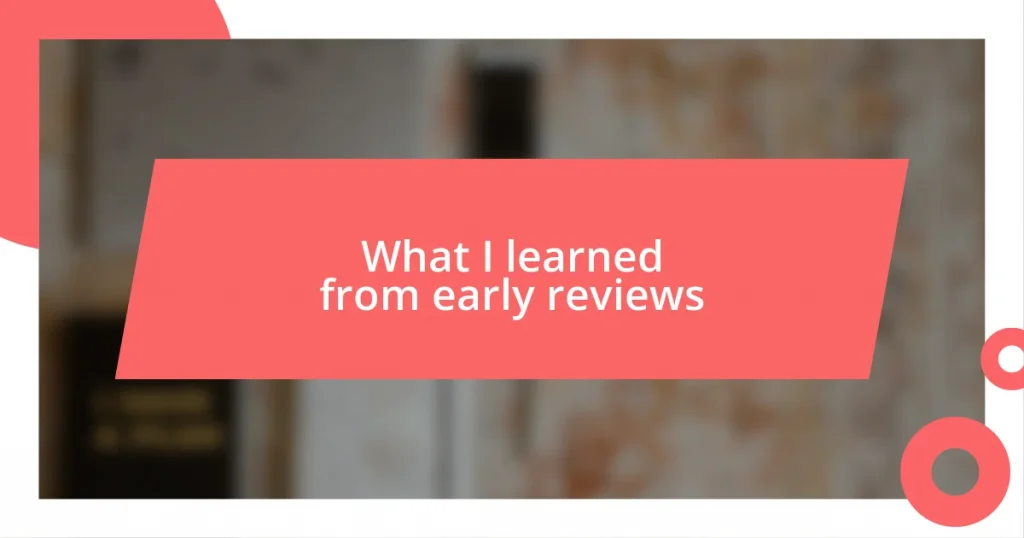Key takeaways:
- Mythological stories connect us to universal themes, reflecting our own struggles and prompting personal reflection through relatable characters and profound narratives.
- Cultural context enriches myths by embedding societal values, moral lessons, and symbolism, enhancing their relevance and depth across generations.
- Engaging with these tales fosters emotional connections, offering lessons in resilience, wisdom, and transformation that resonate with our modern experiences.
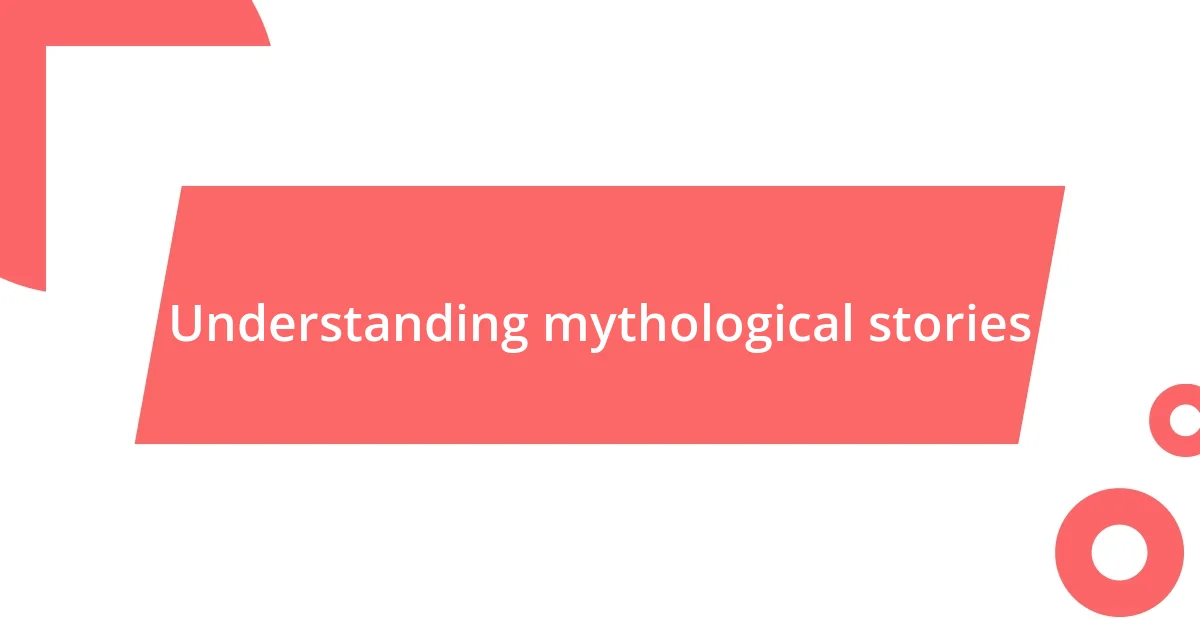
Understanding mythological stories
Mythological stories have a unique way of connecting us to the past, weaving together culture, values, and shared human experiences. I remember my first encounter with Greek mythology, where stories of gods and heroes seemed to jump off the page. Can you recall a moment when a story resonated so deeply that it made you reflect on your own life?
What captivates me in these tales is their exploration of profound themes like love, betrayal, and the quest for identity. It’s fascinating how figures such as Odysseus or Persephone can represent our internal struggles, making us ponder our own journeys. Have you ever felt a connection to a character in a myth, as if their trials mirror your own challenges?
These stories often serve as a mirror, reflecting societal norms and human behavior. I find it intriguing how different cultures use mythology to convey moral lessons. Think of it this way: when you encounter a hero’s journey, aren’t you compelled to examine your own path and choices?
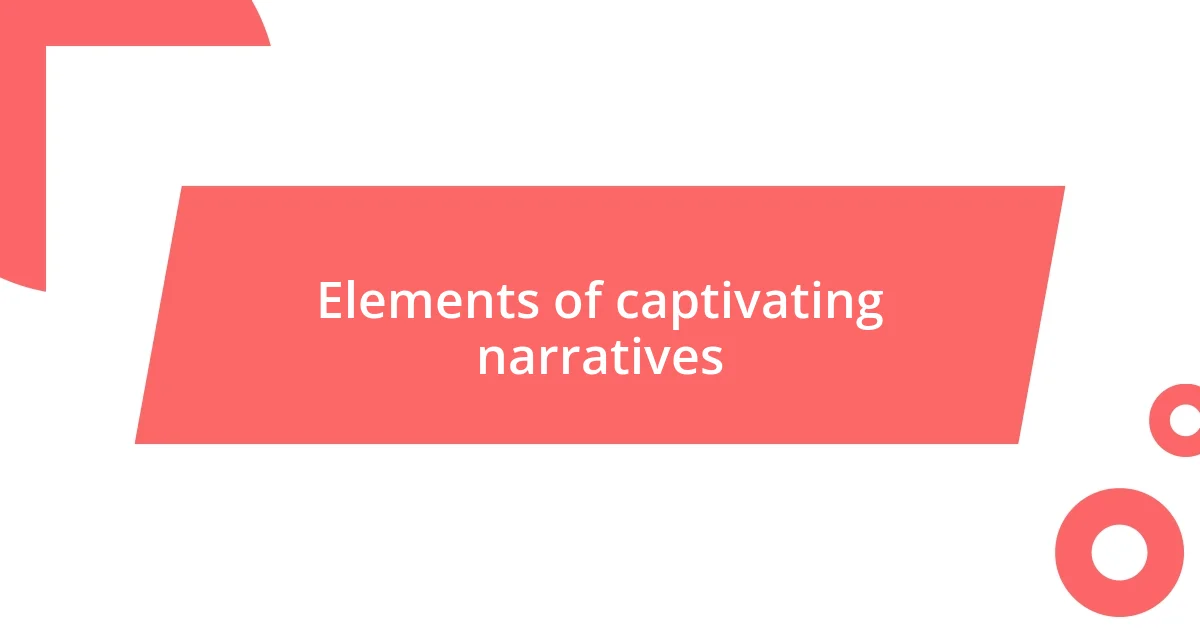
Elements of captivating narratives
Captivating narratives in mythology often involve rich character development, where heroes and villains embody virtues and vices that we all grapple with. I remember feeling a surge of excitement when I first read about the transformation of Loki in Norse mythology. His chaotic nature was both infuriating and relatable, reflecting my own struggles with impulsivity in trying situations. Isn’t it fascinating how a character’s flaws can resonate with our own?
Another critical element is the incorporation of symbolism, which adds layers of meaning to the narratives. For example, the phoenix rising from its ashes symbolizes rebirth and resilience, striking a chord with anyone who has faced adversity. I often find myself drawn to stories where the characters undergo transformations, much like the phoenix—forcing me to consider my capacity for reinvention in my own life. Don’t you think symbols enrich our understanding of the human experience?
Finally, the settings within these tales transport us to different worlds, enhancing the drama and emotional stakes. The open seas of Odysseus’s journey evoke a sense of adventure, and I can almost smell the salt in the air as he navigates challenges. This vivid imagery makes me reflect on my own life’s journeys, both metaphorical and literal, urging me to explore uncharted waters. Wouldn’t you agree that an engaging setting can transform a simple tale into an epic saga?
| Element | Description |
|---|---|
| Character Development | Characters reflect human virtues and flaws, making them relatable. |
| Symbolism | Objects or actions encapsulate deeper meanings, enhancing the narrative. |
| Setting | The backdrop creates emotional stakes, adding depth to the journey. |
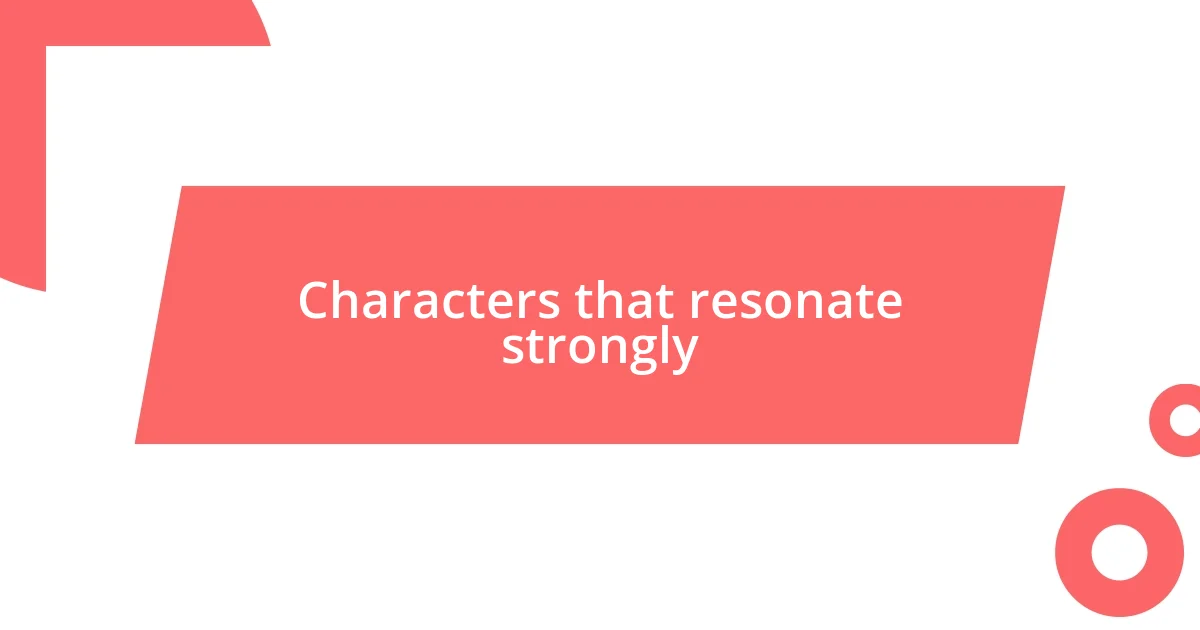
Characters that resonate strongly
Characters in mythological stories often resonate with us on a personal level, reflecting our own emotions and struggles. I vividly remember my initial encounter with the character of Medusa. At first, I viewed her as a monster, but over time, I began to empathize with her tragic backstory and the pain of betrayal that transformed her. It’s incredible how such complex characters can remind us of our own battles, isn’t it? When we see their vulnerabilities, we’re compelled to think about our own feelings of isolation or anger.
- Heroic Figures: Characters like Hercules or Thor symbolize strength but also face doubts and failures, reminding us of our vulnerabilities.
- Tragic Characters: Figures such as Orpheus, who endure heart-wrenching losses, resonate with anyone who’s experienced grief.
- Complex Antagonists: Characters like Hades, often seen as villains, can evoke sympathy due to their nuanced motivations, prompting us to reflect on our own flawed choices.
- Relatable Archetypes: Characters with familiar journeys, like the hero’s quest or the wise mentor, help us navigate our life paths through their stories.
In every mythological tale I explore, these characters evoke a spectrum of emotions. I recall when I read about the goddess Athena, guardian of wisdom, and it dawned on me how often I seek guidance in my own life decisions. Her struggle between warfare and wisdom hit home. It’s these moments of recognition that make these characters unforgettable, urging us to evaluate our choices and aspirations. Isn’t it fascinating how a story can prompt such personal reflection?
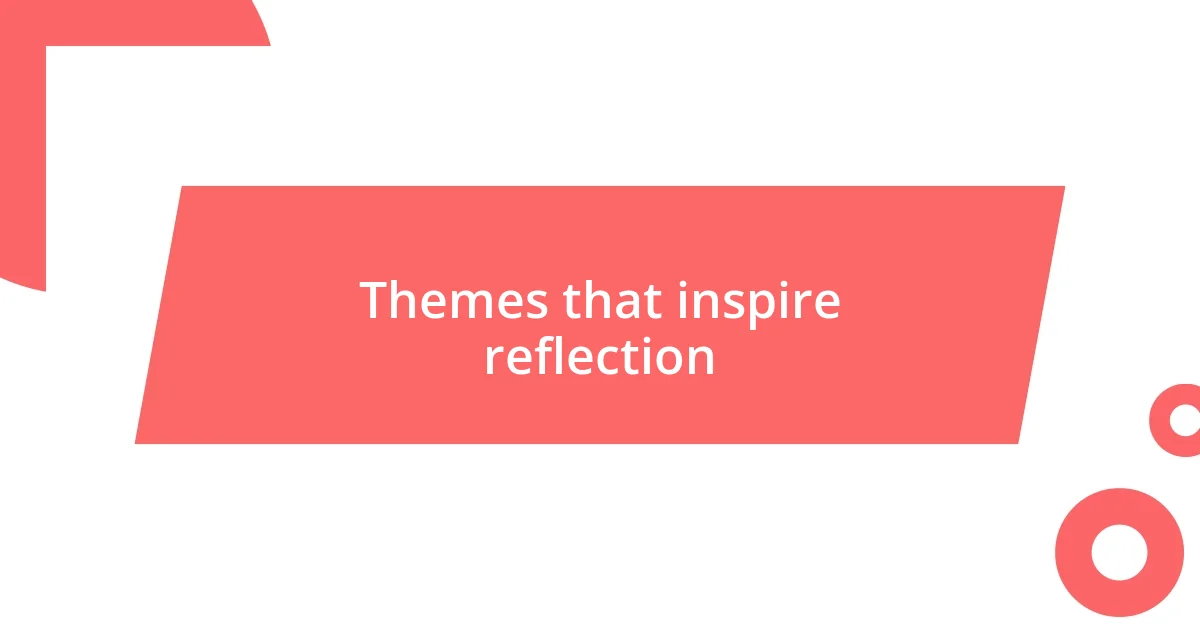
Themes that inspire reflection
Exploring themes in mythological stories often sparks deep reflection within me. For instance, the recurring theme of sacrifice resonates profoundly. I remember the first time I encountered the tale of Prometheus, who faced eternal punishment for bestowing fire upon humanity. That narrative made me ponder the lengths to which I would go for loved ones—would I sacrifice my own comfort for their welfare? It’s a question that still lingers in my mind long after the story ends.
Another theme I often reflect on is the quest for identity, as seen in stories like that of Persephone. Her dual existence in the Underworld and the mortal realm symbolizes the struggle between who we are and who society expects us to be. I find solace in her journey because I, too, have navigated moments of feeling torn between my passions and external pressures. These stories remind me that finding oneself is a timeless battle many share, weaving a connection across generations.
Lastly, the theme of transformation captivates me endlessly, especially in tales like that of the metamorphosis of Daphne into a laurel tree. When I read this story, I couldn’t help but reflect on my own moments of change—those times when I felt like I was shedding an old identity to embrace a new one. Isn’t it intriguing how these transformations in mythology mirror our own experiences of growth and adaptation? Each time I engage with such narratives, I’m compelled to look inward and reassess my journey.
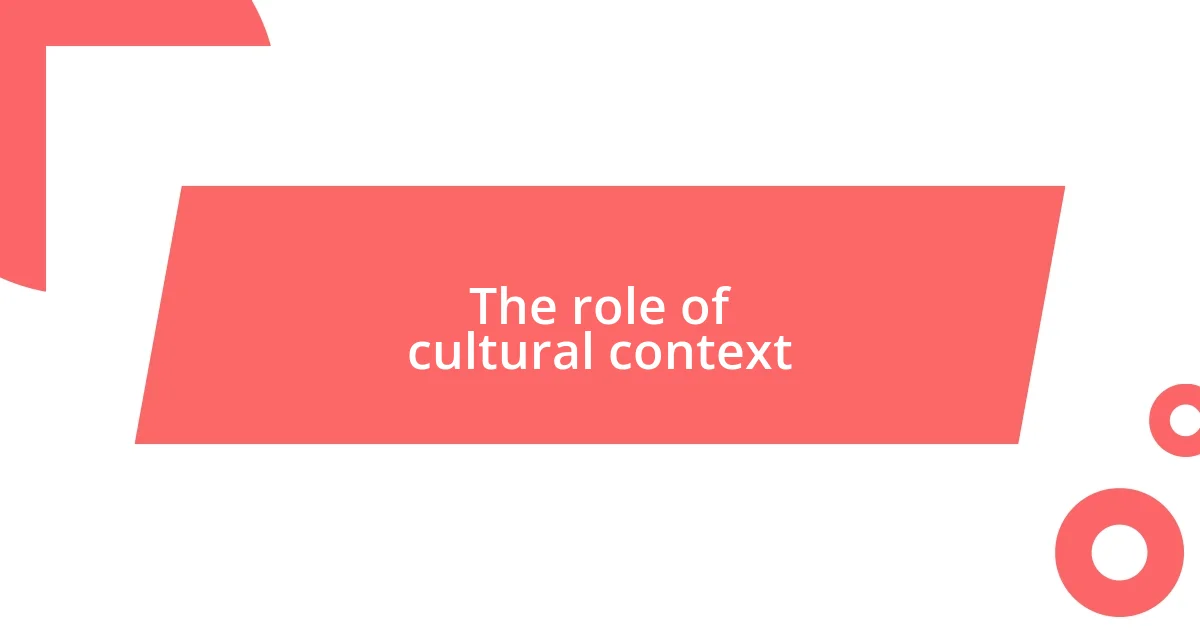
The role of cultural context
Cultural context plays a pivotal role in shaping the myths we engage with. When I first delved into the ancient Egyptian myths, I was struck by how much the symbolism of the Nile River resonated with the lives of the people who revered it. It’s as if this reverence gave life to their stories—each tale as vibrant as the river itself. How often do we overlook the profound relationship between culture and storytelling?
In particular, the societal values reflected in mythological narratives can be eye-opening. I remember discovering the Japanese tale of Amaterasu, the sun goddess, and how her actions were deeply rooted in Shinto beliefs about harmony and respect for nature. Those values inspired me to reflect on my own relationship with the environment. It made me ask: how do my cultural beliefs influence my perspectives today?
Moreover, the moral lessons woven into these stories often mirror the ideals of the cultures from which they originate. For instance, I found the Greek myth of Arachne particularly compelling. The tale highlights societal views on pride and humility, something that resonates across cultures and eras. I couldn’t help but connect it to my own experiences, where I’ve witnessed the balance between confidence and arrogance in my endeavors. Isn’t it interesting how cultural contexts breathe life into these lessons, making them timeless yet very much anchored in their origins?
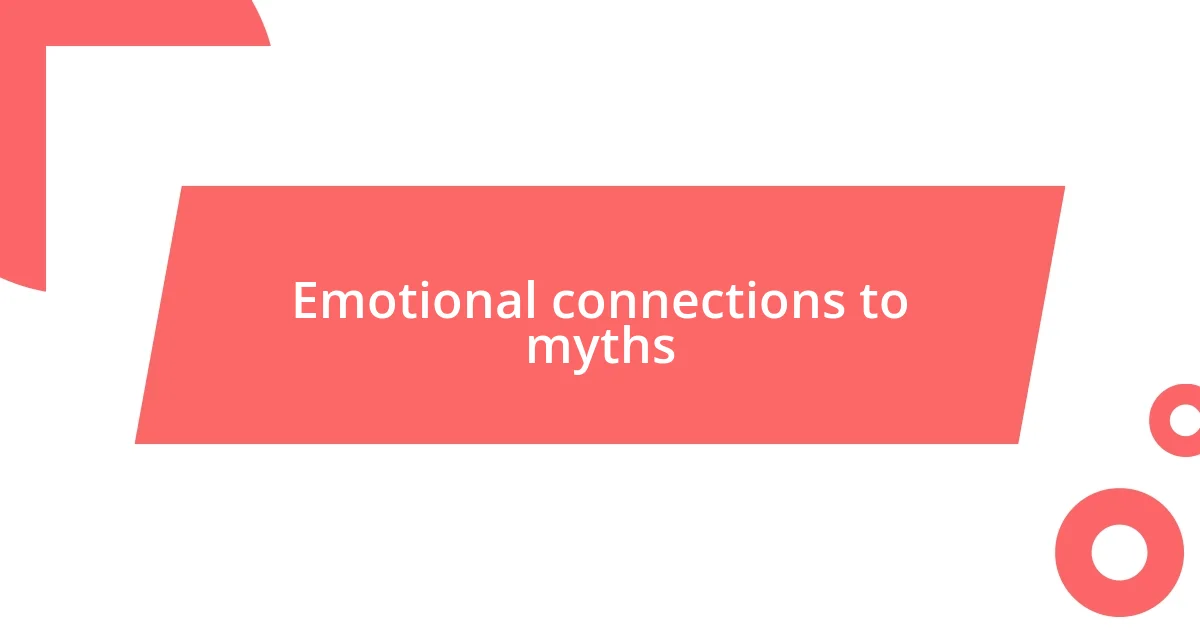
Emotional connections to myths
It’s fascinating how myths stir up deep emotional connections within us, often tapping into our own experiences and struggles. I recall a time when I was feeling particularly lost after a significant change in my life. I turned to the story of Orpheus, whose love for Eurydice drove him to the depths of the Underworld. His grief resonated with me, and it made me realize that love isn’t just about joy; it’s also about navigating the pain of loss. Can such stories elevate our understanding of love and grief? I believe they can, providing a safe space to explore those feelings.
Then there’s the element of vulnerability woven into mythological tales. Take the story of Icarus, who flew too close to the sun. I couldn’t help but see myself in his ambition and reckless choices. I often wonder, have I ever pushed my own limits too far in pursuit of my dreams? Reflecting on that parallel helped me embrace my own vulnerabilities and recognize the importance of balance in life. Myths serve not only as cautionary tales but also as mirrors reflecting our own human experiences back to us.
The emotional depth in these stories captures our collective fears and hopes. For instance, I was particularly touched by the tale of the phoenix, representing rebirth after adversity. When I faced a significant setback in my career, I found solace in this myth. It reminded me that the end of one chapter can be the beginning of another. Isn’t it amazing how a story from centuries ago can provide comfort during modern struggles? That’s the magic of mythology; it connects us through time and emotion, offering us lessons that are eternally relevant.
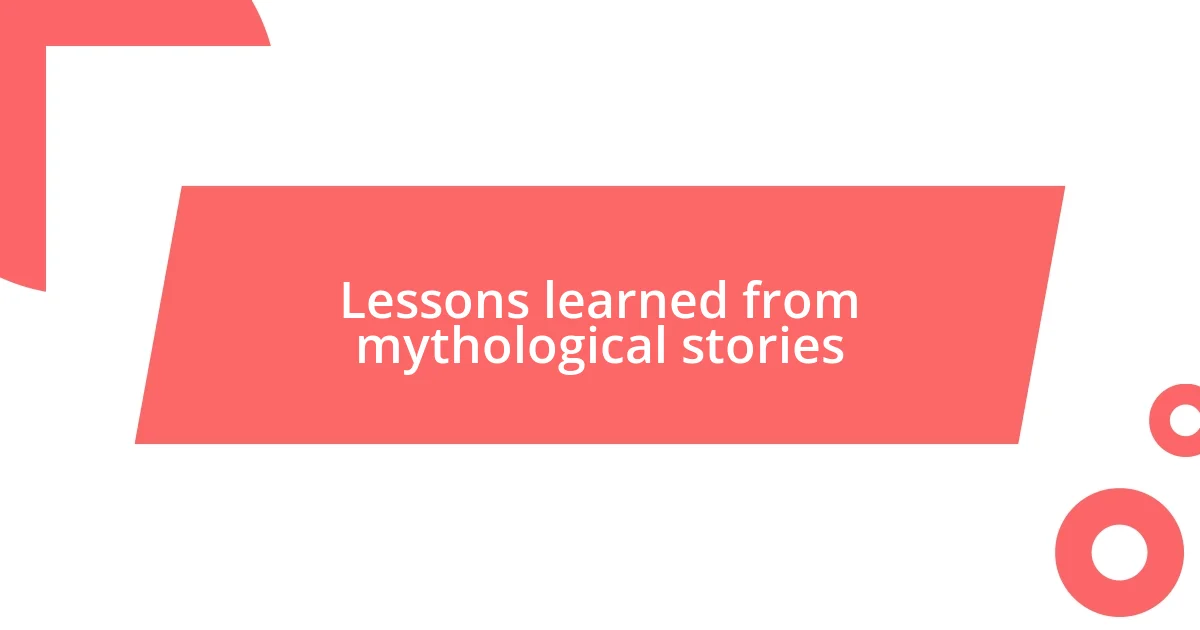
Lessons learned from mythological stories
Reflecting on the lessons learned from mythological stories often brings to mind the concept of resilience. I remember encountering the tale of Hercules and his twelve labors during a particularly challenging time in my life. Each labor was a daunting task that required immense strength and determination. I found myself thinking: if Hercules could face such overwhelming challenges, what’s stopping me from overcoming my own obstacles? This realization was empowering, pushing me to dig deep and confront my struggles head-on.
Another significant lesson I gleaned from these narratives is the importance of wisdom in decision-making. The story of King Solomon, known for his unparalleled wisdom, made me reflect on moments in my own life when I’ve had to make tough choices. I vividly recall a time when I was torn between two career paths. Solomon’s story taught me that seeking knowledge and guidance before acting can lead to better outcomes. How often do we rush into decisions without considering their long-term impact?
Lastly, I’m continually fascinated by the theme of transformation found in many myths. The metamorphosis of Daphne into a laurel tree to escape Apollo’s pursuit struck a chord with me as I navigated a significant personal change. In those moments of transition, I asked myself: what if I embraced the change rather than resisted it? This lesson in acceptance has profoundly influenced my outlook on life’s inevitable transformations, encouraging me to see endings as beginnings. Isn’t it incredible how these age-old stories can guide us through our modern complexities?










